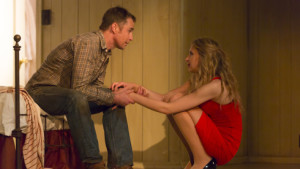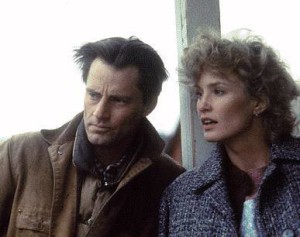Shepard Staying Power
It was Halloween at the Samuel J Friedman Theater. A motley audience had gathered for the Manhattan Theatre Club production of FOOL FOR LOVE by Sam Shepard. We were there to witness a deadly dance to a song with a haunting rhythm that has played in our heads for more than thirty years.
The women might have worn red dresses, like May (Nina Arianda). The men might have dressed in the manqué of the Marlboro man, like Eddie (Sam Rockwell). But, apart from a few witches and zombies, we were there dressed as ourselves, commiserate fools. And that was enough.
FOOL FOR LOVE is about all of us. It’s that rare play that gets beyond the bickering of the central characters and digs deep into our emotional pants. Caring about some other more than yourself is at once spooky and rapturous, destructive, life-affirming, what we’ve all gone through and go it again with Eddie and May.
It is the kind of play I would gladly take in a dozen times. What strikes me about the script, now as much as it did in the 80s, is how demanding and courageous it is. The play asks for so much from the actors while giving so much. It is the perfect mix of bone-bruising movement, dialogue that is both cryptic and scary fun, and—not the least—arresting quasi-natural storytelling.
On the Edge of the Mojave Desert
Sam Shepard was born in Fort Sheridan, Illinois, but grew up all over the Southwest. A pilot during WWII, his father was a Spanish teacher, a problem drinker, who moved the family around. They ended up on an avocado ranch on the edge of the Mojave Desert. It was here at the edge of nowhere that the playwright set the table for May and Eddie, the half-brother and sister who can’t live with or without each other.
In the Introduction to Fool for Love and Other Plays, Ross Wetzsteon comments that in the plays of Sam Shepard space is emotional more than physical. In FOOL, he says, the play takes place within the emotions of the characters as much as the confines of the set.
There is something so intimate, almost womb-like, about that bare, seedy motel room on the edge of the Mojave Desert. With the talk of crying from Eddie over the 2480 miles it took to get there, the actual crying from May, the shouting and the tequila, the kissing and then the knee to the groin, the body slamming, Eddie slithering under the bed on his back, May embracing the wall, the liquidy way the sibling characters seem to inhabit every inch of the motel room—the set comes off as a living entity, as this wet, churning, pulsing thing.
Shepard wrote and directed FOOL FOR LOVE when he was artist-in-residence at the Magic Theatre in San Francisco in 1983. And it is a kind of magic trick, turning the dry rectangle of motel space into something like its opposite. Shepard’s former collaborator Patti Smith once described a concert venue where she was performing as feeling like the inside of a puppy’s stomach. She might as well have been describing the set for Sam’s play.
The Origin of the Play for Shepard
FOOL FOR LOVE involves a male and female character going at it like nothing in the previous work of Shepard, some forty plays. The character May infuses the action with a feminine spirit that matches Eddie’s masculine energies. Asked about the genesis of the play in a Paris Review Interview, Shepard says: “The play came out of falling in love. It’s such a dumbfounding experience. In one way you wouldn’t trade it for the world. In another it’s absolute hell.”
If FOOL FOR LOVE seems to possess a kind of gut wisdom, as if drawn from the instincts of a playwright in tumult, it’s because Shepard wrote the play while his marriage to the actress O-Lan Jones was ending and his love with another actress, Jessica Lange, was beginning. Shepard speaks tellingly about the effect of his falling in love. “More than anything, falling in love causes a certain female thing in a man to manifest, oddly enough.”
And to his credit as a playwright, he allows this newly awakened feminine aspect of his psyche to be a force in the play. A certain female thing manifests and that creature is May. The first image of May, as staged by director Daniel Aukin, is her sitting on the bed, legs apart, head down and hair hanging like a blond curtain to the dusty wood floor. The first word of the play is her name.
Eddie says, “May, look. May? I’m not goin’ anywhere. See? I’m right here. I’m not gone. Look.” She doesn’t move at all and then moves decisively, grabbing a hold of his closet leg with both arms. He offers to leave and her first word is “No!” It’s an ending in the beginning, the angry pillow talk after sex that characterizes their repartee. She tells him his fingers smell of a woman she calls the Countess.
Then May says, “I’m smarter than you are and you know it. I can smell your thoughts before you even think ‘em.” She threatens to kill him and the Countess with separate knives so the blood doesn’t mix. He denies any fling with the Countess. She calls him a liar. She says, “You were bumping her on a regular basis! Don’t gimme that shit.” Eddie tells her she can believe whatever she wants. And then she delivers one of the play’s most important lines: “I’ll believe the truth. It’s less confusing.”
For the rest of play May’s quest is to get to the truth. It’s plain she doesn’t want to go through the same thing anymore. In a 2010 interview for The Guardian, Shepard speaks about the remarkable honesty of his longtime companion, by then, Jessica Lange. He says, “I’ve never known her, ever, to lie about anything.” And it’s this allegiance with veracity that Shepard allowed his love to bring to the play.
Shepard Getting to the Heart of the Matter
After Eddie carts out his fantasy to take May away to farm life in Wyoming, she goes to into the bathroom and slams the door. Her disembodied voice counters his insidious make-believe.
I hate chickens! I hate horses! I hate all that shit! You know that. You got me confused with somebody else. You keep comin’ up here with this lame country dream life with chickens and vegetables and I can’t stand any of it. It makes me puke to think about it.
She comes out of the bathroom and with amazing candor reveals the source of her pain. “How many times have you done this to me?” He plays dumb. “Suckered me into some dumb little fantasy and then dropped me like a hot rock. How many times has this happened?”
At the start of the play May has begun to rebuild her life. She has a job as a cook. She has a date for the movies that night. The audience’s sympathies are with her both when she tenderly kisses Eddie and then knees him in the groin. This is May yo-yoing Eddie just as he has done to her. We’re with her. We want to know what’s actually going on.
The Fantasy World of Men
Just when Eddie and his bull shit need reinforcement, The Old Man, the character who has been sitting there drinking from a Styrofoam cup on the edge of the set, speaks to his son: “I thought you were supposed to be a fantasist, right? Isn’t that basically the deal with you? You dream things up. Isn’t that true?”
The Old Man (Gordon Joseph Weiss) gives Eddie a stern talking to and an illustration. He tells him to look up at an imaginary picture of Barbara Mandrell. He claims to be married to the country-western singer. Eddie doesn’t believe him for obvious reasons.
“Well, see, now that’s the difference right there,” says The Old Man. “That’s realism. I am actually married to Barbara Mandrell in my mind. Can you understand that?”
This delusional wedlock of his father wonderfully anticipates, possibly inspires, an encounter with Eddie’s problem girl. My favorite moment in the play comes after headlights arc across the stage through the window. Thinking the lights are a signal for the arrival of her movie date, May opens the motel-room door and stands there staring out into the darkness. She sees something out of place, a “big, huge, extra-long, black Mercedes-Benz.” Her humorous use of redundant adjectives indicate a shift in the world of the play.
May tells Eddie, “Somebody’s sitting out there in that car looking straight at me.” The tension is skillfully built, and the audience is invited to imagine what May sees, this woman staring straight at her from this long hearse-like vehicle, an agency of death and destruction. Here May has come face to face with the entity who gave the smell to Eddie’s fingers, the scented phantasm of his denials, the abyss-like other woman in the torturous picture May can’t forget, . . . the Countess.
Inconclusive? You think so, Sam Shepard?
Shepard credits the European theatre of the 1960s, the work of Samuel Beckett in particular as having the largest literary influence on his work. The result, as Ross Wetzsteon has written, is that his plays are “at once so passionately engaged and so restlessly inconclusive.” About stage-writing, Shepard tells us, “I think it’s a cheap trick to resolve things.”
In the Paris Review interview he is more empahatic: “The temptation towards resolution, towards wrapping up the package, seems to me a terrible trap.” But, on the other hand, he does seem to wrap up FOOL FOR LOVE. Once Martin–May’s movie date–finally arrives, Eddie chronicles the back story of him and May leading up to the strange day when as teens they first laid eyes on her each other. Then refusing to be silenced, May finishes the story of The Old Man married to both their mothers with the horrifying conclusion. And we gather, from the resistance of The Old Man, that the shotgun suicide of Eddie’s mother has never been voiced. And herein lies the question. After all the audience goes through with Eddie and May, are we to believe that we have just experienced one cycle in an endlessly reoccurring nightmare? Or have we witnessed an advance in the story, something that makes that night very different from their other encounters?
Shepard offers his thoughts after finishing the play:
I had mixed feelings about it when I finished. Part of me looks at FOOL FOR LOVE and says, This is great, and part of me says, This is really corny. This is a quasirealistic melodrama. It’s still not satisfying; I don’t think the play really found itself.
In 1984 FOOL FOR LOVE won five Obies and was a finalist for the Pulitzer, the year that David Mamet’s Glengarry Glen Ross took the prize. If you’ve read or seen the play recently, what do you think? There’s no right or wrong to this one, just speculation on a play that resists analysis. As I write this post, there’s still time to see a performance on Broadway. The Manhattan Theatre Club run has been extended until December 13th. Or read the play. In an upcoming post I’ll have more to say about Eddie and The Old Man.




Leave a Reply